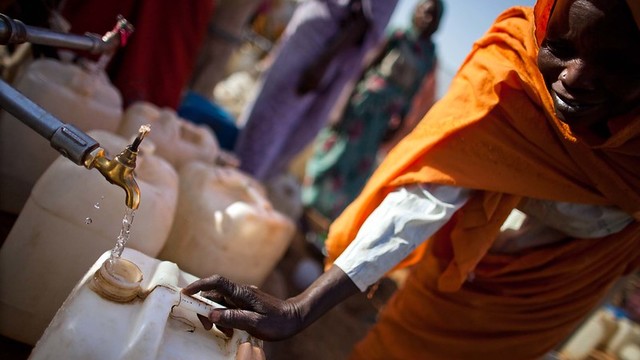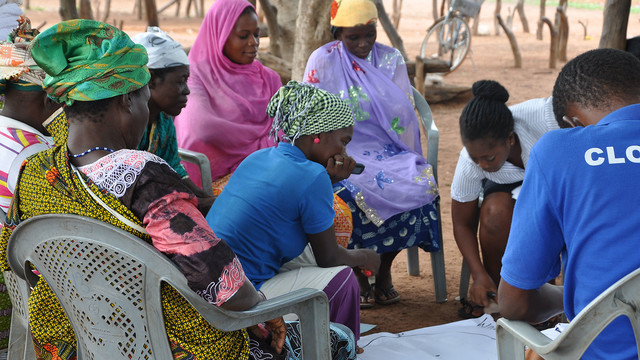Why women's empowerment is essential for sustainable development
Is women's empowerment just the 'right thing to do'? A new book argues that there are deeper connections between gender equality and genuinely sustainable development.


The Deccan Development society works with poor women in Andhra Pradesh, India. It facilitates a network of women seedkeepers who conserve and exchange seeds (Photo: Deccan Development Society)
Gender equality is rightly seen as crucial to sustainable development, with its own Sustainable Development Goal (Goal 5). Yet the interconnections between environmental sustainability and women's empowerment have often been overlooked in practice – particularly in the environmental movement.
Now a new collection of essays by researchers, politicians, campaigners and senior business figures puts forward a powerful argument for change. Why Women Will Save the Planet argues that these interconnections must be fully reflected not only in programmes on the ground, but also within our own organisations and by working across sectors and disciplines.
Three good reasons why
First, gender equality is a moral imperative whether you're in government, business, non-governmental organisations (NGOs) or research institutions – it's simply the 'right thing to do'.
Gender bias is still deeply embedded in cultures, economies, political and social institutions around the world. Women and girls face unacceptable levels of discrimination and abuse, which is not only wrong, but also prevents them from playing a full part in society and decision-making.
There has been some progress – such as IIED's own gender review and audit – but nowhere near enough. More organisations need to understand and address internal imbalances and proactively seek to do so in delivering their business. Barbara Stocking, former chief executive of Oxfam GB, writes in the book: "Leadership from the top is essential but the values of gender equality have to permeate the whole organisation."
Secondly, women are key managers of natural resources and powerful agents of change. Nidhi Tandon's research with rural women in Liberia and Fatima Jibrell's work in Somalia show how women are often more directly dependent on natural resources, with responsibility for the unpaid work of securing food, water, fuel and shelter for their household.
"Not just victims, women have been and can be central actors in pathways to sustainability and green transformation," according to the contribution from Lyla Mehta and Melissa Leach.
Women bring a different perspective
Women are more vulnerable to environmental degradation and climate change but also have different perspectives, concerns and ideas for change. Until these are taken on board, with women empowered to play a full part in decision-making at all levels, environmental sustainability will remain a distant goal.
Yet women's empowerment must not mean simply adding to their burdens of responsibilities or building expectations of women as 'sustainability saviours'. Diane Elson, an adviser to UN Women, argues in her contribution that "the disproportionate responsibility that women bear for carrying out unpaid work is an important constraint on their capacity to realise their rights... Both women and men need time to care for their families and communities, and time free from such care."
Counting the invisible contribution
This leads us to the third reason for integrating women's empowerment into sustainable development, and it reaches deeper down to the underlying causes of both issues: in most societies and economies, women's unpaid work and nature's services are not accounted for and therefore not valued properly in our economic, political or social systems.
Julie Nelson argues that "Women and nature are largely invisible in mainstream economics... One would search in vain in the core models of economics for any inkling of where the materials used in production came from, or where the waste goes... for a discussion of where people come from, or where they go when they are broken or used up. When considered at all, women and nature are treated as passive 'resources'."
Parallels between the treatment of women and nature are no coincidence, but have an ancient history in mythology and religion, with powerful concepts such as 'Mother Earth'. Nelson and others argue that this encourages unhelpful perceptions of women and nature as endlessly (re)productive and nurturing.
She argues: "They are assumed to possess an infinite capacity for self-maintenance and self-regeneration". So, in a world where we measure wellbeing and progress by GDP and economic growth, the goods and services that women and nature provide remain unaccounted for.
Diane Elson, Vandana Shiva and other contributors argue that we need a transformation in our economic thinking and new definitions of progress. Across politics, business and the media, we need to create a system based on different values, with equality and sustainability at its core.
"GDP is now widely recognised as inadequate... measures of happiness and wellbeing are both now credible alternatives", writes Fiona Reynolds, former head of the UK's National Trust.
IIED's research, advice and advocacy has long recognised the gender dimensions of sustainable development but there is more to be done to influence wider policy and practice.
This new book, published as part of Friends of the Earth's Big Ideas project, reinforces the importance of fully integrating the 'gender agenda', not only because it is the right thing to do, or because it can improve the effectiveness of interventions, but because it addresses the root causes of these issues and helps us to develop transformative solutions.
Jenny Hawley (jennyhawley2020@gmail.com) is a consultant and editor of Why Women Will Save the Planet, which is published by Zed Books.



